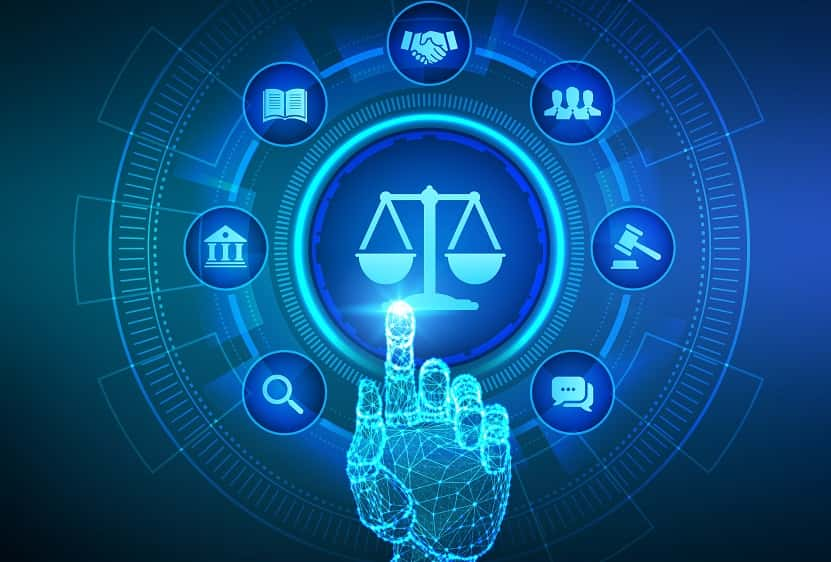How do artificial intelligence and automated decision-making impact the legal arena?
How do artificial intelligence and automated decision-making impact the legal arena?
A European project coordinated by UPF, driven by a consortium of eleven institutions, is to study the use of artificial intelligence (AI) in the legal field as well as the challenges it poses in respecting fundamental rights. “JuLIA” will analyse the use of AI in decision-making by both public administrations and private agents and e-commerce platforms; it will offer all legal operators analytical tools to understand the regulatory challenges posed by the design of algorithms and their behaviour and will carry out regulatory proposals within the EU.

The use of artificial intelligence (AI) tools in decision-making affects the guarantee of fundamental rights, with particular attention to the principles of transparency, a fair trial, non-discrimination and data protection that should guide the design and implementation of systems based on AI technology.
In the near future, as the use of AI increases, the jurisprudence related to decision-making by means of AI systems will become increasingly important in legal proceedings and in decisions made by administrations and by public and private agents.
The project “Justícia, Drets Fonamentals i Intel·ligència Artificial” (JuLIA: Justice, Fundamental Rights and Artificial Intelligence), within the framework of the Justice Programme of the Directorate-General for Justice of the European Commission, will analyse the impact of automated decision-making on fundamental rights and will study the regulatory framework of the European Union in the field of AI.
Mireia Artigot Golobardes: “With JuLIA we want to provide the analytical tools for judges and lawyers, with the help of information technology experts, to understand the mechanisms involved in algorithmic behaviour”
JuLIA, which kicked off on 1 February 2023 with a total budget of some 950,000 euros over three years, will be coordinated by Pompeu Fabra University and driven by a European consortium formed by eleven institutions from Spain, Italy, France, the Netherlands, Portugal and Poland.
Mireia Artigot Golobardes, a Ramón y Cajal researcher at the UPF Department of Law, is the principal investigator of the project at the University, leading a team of ten researchers, all experts in digital markets and consumer law, as well as in different branches of civil law, such as health law.
“With JuLIA we want to provide the analytical tools for judges and lawyers, with the help of information technology experts, to understand the mechanisms involved in algorithmic behaviour and be able to evaluate their legal implications, preserve their independence and impartiality, avoid discriminatory practices and guarantee compliance with fundamental rights”, Mireia Artigot Golobardes explains.
A project that will provide training, guidance and collaboration
JuLIA will provide members of the judiciary, judges and lawyers with an overview of the jurisprudence of the European Union and its Member States in this area, in order to foster their competences and judicial dialogue.
The topics chosen for their training will stress respect for the rule of law in judicial decision-making using AI tools, which will be addressed throughout Europe (taking into account both the jurisprudence of the EJC and of the ECtHR) and without neglecting digitization.
It will also provide guidance to legal operators with the aim of translating the design and mechanisms of AI systems into legal categories in order to ensure respect for fundamental rights. Moreover, it will facilitate mutual learning and collaboration between judges, legal professionals and technical experts in the field.
Analysis of automated decision-making in different contexts
JuLIA will analyse the use of automated decision-making to support decision-making in the following areas:
-Legal: AI must be compatible with fundamental rights.
-Public administrations: conciliation with aspects such as administrative discretion, transparency and the principle of a fair administrative procedure.
-Health law: the use of AI tools in the medical field must respect patients’ fundamental rights, such as being informed or consenting to medical treatment, and it is also necessary to analyse the impact on liability for medical negligence, among others.
-Digital platforms (specifically “e-commerce”) and consumer protection: prevent the behaviour of the algorithm giving rise to practices that endanger the functioning of the market where the rights of consumers may be violated.
An important and transversal aspect of the project, which will be applied in all the contexts analysed, will be the issues that relate the use of AI to data protection and non-discrimination
An important and transversal aspect of the project, which will be applied in all the contexts analysed, will be the issues that relate the use of AI to data protection and non-discrimination. In this sense, “gender and intersectional perspectives will be considered as a means to detect discrimination and to evaluate the risks in treatment for the person in question”, Mireia Artigot Golobardes assures.
A consortium made up of eleven institutions, led by UPF
Apart from Pompeu Fabra University (coordinating centre), the consortium will be made up of the universities of Trento, Versailles, Groningen, Coimbra, the Polish Institute of Legal Studies of the Academy of Sciences, the Italian School of Magistracy, the Dutch National School of Magistracy, the General Council of the Judiciary (CGPJ) and Fundación LIBRe.
The UPF research team, coordinated by Mireia Artigot Golobardes, is composed of the following members of the Civil Law area: Fernando Gómez (full professor), Sonia Ramos (associate professor), Carlos Gómez (associate professor), Rosa Milà (Ramón y Cajal researcher), Nicola Lucchi (Serra Húnter researcher), Pablo Salvador Coderch (emeritus professor), and PhD candidates Laura Herrerías, Roger Barat and Sébastien Fassiaux.

AI, the thread of two other research projects in the UPF Department of Law
Apart from the European project JuLIA, which is starting now, Mireia Artigot Golobardes is the principal investigator of two other research projects, also linked to artificial intelligence, which focus on digital platforms and algorithms.
The project iConsumers (Protecting Consumers in Digital Platforms) focuses on consumers on digital transaction networks from three different angles: consumers themselves as consumers, consumers as products, and consumers as consumers and products at the same time. The result of the research will enable to better understand and differentiate the contractual relationships that are generated in the environment of e-commerce platforms and the obligations towards consumers in order to design policies for data markets that are compatible with consumer rights.
The project AlgorithmLaw (Algorithmic Decisions and the Law: Opening the Black Box) is framed in a context in which algorithms are increasingly used in vertical relationships between public bodies and individuals, but also in horizontal relationships between individuals in private transactions, such as those generated on digital platforms, specifically “e-commerce”. The project will map algorithmic disruption and open the “black box” of algorithmic decisions. To do so, it will study how transparency can be improved in this area, to fight against results that could be biased and discriminatory and that violate people’s fundamental rights.
iConsumers is framed in the State Plan for Scientific and Technical Research and Innovation 2021-2023, and AlgorithmLaw, in the Strategic Projects Oriented to the Ecological Transition and Digital Transition 2021, both funded by the Spanish Ministry of Science and Innovation.
